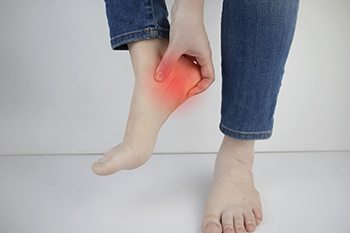
Heel pain, especially first thing in the morning, can often be a sign of plantar fasciitis. This condition occurs when the plantar fascia, a wide band of tissue that runs from your heel to your toes, becomes inflamed or develops small tears. The pain can be sharp, particularly with the first steps after getting out of bed, but it often recedes as you move throughout the day. Plantar fasciitis is more common among people who are overweight, older adults, and athletes, especially those who run on hard surfaces. A podiatrist can help by diagnosing plantar fasciitis through an exam. This foot doctor may recommend treatment that includes certain stretches, choosing more supportive footwear, or taking prescription-strength anti-inflammatory medication. These treatment methods aim to reduce inflammation and support the tissue's healing process. If you have heel pain first thing in the morning, it is suggested that you visit a podiatrist for an exam to find out if you have plantar fasciitis.
Plantar fasciitis is a common foot condition that is often caused by a strain injury. If you are experiencing heel pain or symptoms of plantar fasciitis, contact one of our podiatrists from Dr. Jeffrey J. Betman & Associates . Our doctors can provide the care you need to keep you pain-free and on your feet.
What Is Plantar Fasciitis?
Plantar fasciitis is one of the most common causes of heel pain. The plantar fascia is a ligament that connects your heel to the front of your foot. When this ligament becomes inflamed, plantar fasciitis is the result. If you have plantar fasciitis you will have a stabbing pain that usually occurs with your first steps in the morning. As the day progresses and you walk around more, this pain will start to disappear, but it will return after long periods of standing or sitting.
What Causes Plantar Fasciitis?
- Excessive running
- Having high arches in your feet
- Other foot issues such as flat feet
- Pregnancy (due to the sudden weight gain)
- Being on your feet very often
There are some risk factors that may make you more likely to develop plantar fasciitis compared to others. The condition most commonly affects adults between the ages of 40 and 60. It also tends to affect people who are obese because the extra pounds result in extra stress being placed on the plantar fascia.
Prevention
- Take good care of your feet – Wear shoes that have good arch support and heel cushioning.
- Maintain a healthy weight
- If you are a runner, alternate running with other sports that won’t cause heel pain
There are a variety of treatment options available for plantar fasciitis along with the pain that accompanies it. Additionally, physical therapy is a very important component in the treatment process. It is important that you meet with your podiatrist to determine which treatment option is best for you.
If you have any questions, please feel free to contact our offices located in Northwest Chicago, Southwest Chicago, and Wicker Park, Chicago, IL . We offer the newest diagnostic and treatment technologies for all your foot care needs.
